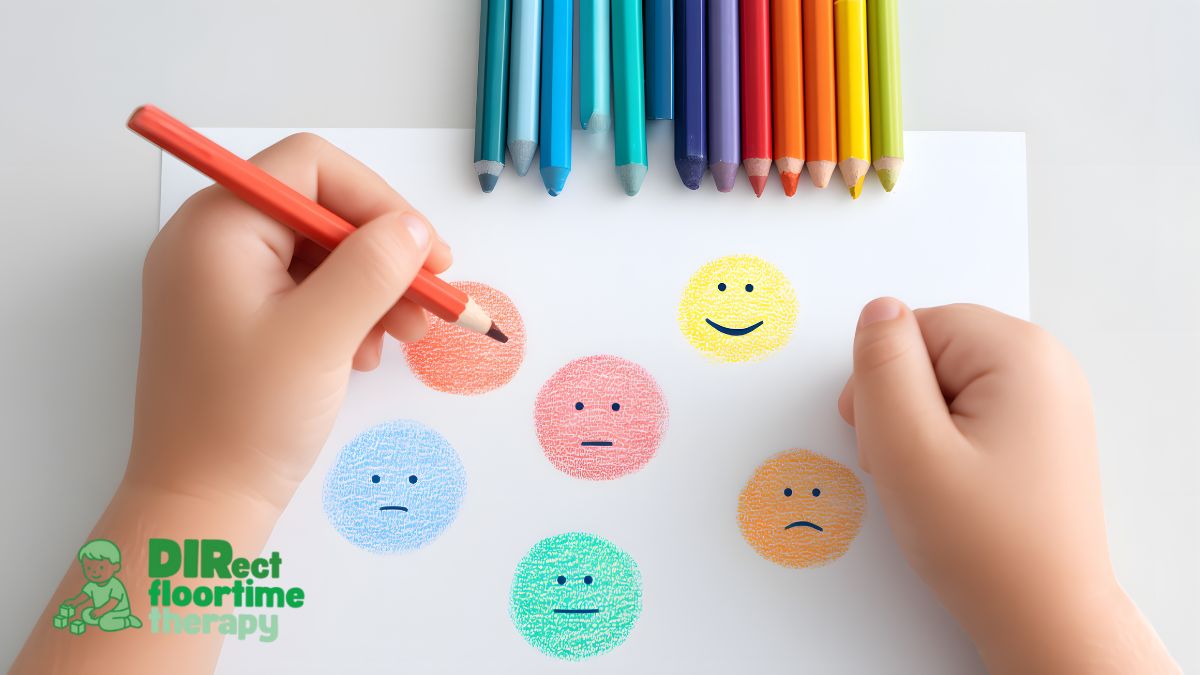Key Points:
- Empathy-led therapy helps children naturally develop emotional understanding, confidence, and social skills.
- Play-based and perspective-taking activities strengthen connections and foster compassion daily.
- Parental involvement and guided therapy create lasting growth in empathy and resilience.
What is the first thing that springs to mind when you envision your child growing up? Acquiring literacy skills? Making friends? Yes, these accomplishments are exciting. However, empathy stands out as a skill that subtly influences all other skills.
It shapes how children grow.
Empathy is the capacity to fully comprehend the feelings of another individual, which can aid children in overcoming obstacles and establishing friendships. It helps kids connect deeply.
The best thing is that therapy can provide a secure environment for your child to develop this ability. It gives them a safe space.
Learning through play, trust, and careful supervision, empathy-led therapy assists children with understanding others and exploring emotions. It teaches feelings that last.
What makes this important, then, and how does it manifest itself in daily life?
Let’s explore it together today.
The Value of Empathy in Early Life
The quality of empathy is not merely a “nice-to-have.” It fosters the development of relationships in children. Did you know that children who possess it settle disputes amicably and recover from setbacks more quickly?
It shapes strong emotional skills. This is supported by research (Eisenberg et al., 2010).
The daily activities foster the development of empathy. To put it briefly, the foundation of emotional intelligence is empathy.
But how does it expand?
Kids start small. Sharing toys. Comforting a friend. Noticing someone’s mood. Each small action builds a foundation for deeper understanding.
That’s where therapy steps in. It teaches perspective and understanding.
Kids can actually learn empathy. It starts with simple steps.
Role-playing helps them see others’ feelings. Encouraging introspection deepens their understanding. It strengthens emotional connections day by day.
The good news is that a 2017 study published in the Journal of Child Psychology and Psychiatry discovered that children who engaged in empathy-based therapy had improved social awareness and collaboration in the classroom.
Results showed measurable classroom improvements. Imagine it—one story, one play activity, sparking real growth in your child.
How Approaches to Therapy Build Empathy
What is the goal of all approaches to therapy? Creating a safe atmosphere for children. A place where kids may express themselves freely.
They learn feelings through practice.
Youngsters can learn to recognize both their own and other people’s feelings. This happens through imaginative play and group activities.
It builds understanding every day.
Here are three tried-and-true methods:
- Play Therapy—Kids act out real or imagined scenarios with toys. Studies show play improves emotional recognition.
- Perspective-Taking Discussions—Simple guided talks help children imagine how someone else feels.
- Parental Involvement—Kids pick up empathy when parents model it. They do more than just observe; they take it in. These tactics have a cascading effect when combined. Children feel understood and pass it on.
Child-Centered Play Therapy
One of the most effective empathy-led methods is child-centered play therapy. Instead of talking, children use play as their language. Blocks, dolls, or art supplies help them express feelings words can’t capture. A child struggling with sadness might act it out with a toy family. Another might construct a tower and then demolish it as a way to vent their displeasure. The therapist guides emotional processing, observes, and reflects.
This is supported by research. A 2016 study in Professional Psychology: Research and Practice revealed something exciting. Kids in play therapy developed stronger empathy. They feel truly heard when leading play.
This increases consciousness and self-worth. Parents can even bring it home—unstructured play therapies for kids send the message, “Your feelings matter. I’m listening.” Isn’t that the emotional safety every child deserves?
Things That Make Empathy Come to Life
After the session is over, therapy continues. Daily tasks that foster empathy in enjoyable and memorable ways include:
- Reading stories from diverse perspectives—discussing character feelings.
- Emotion charades—turning emotional recognition into play.
- Community service shows how empathy truly matters.
Studies reveal that simple activities like role-playing and storytelling actually boost a child’s ability to understand others and solve problems more effectively (Denham et al., 2012). The more children practice, the more natural empathy becomes.
Teamwork Activities for Kids

Teamwork is another simple, powerful tool. Group games, art projects, or classroom experiments teach collaboration, listening, and valuing different perspectives. Why does it matter? Working toward a goal helps kids appreciate others’ viewpoints.
- Building projects—Lego cities, cardboard forts—teaches patience, compromise, and communication.
- Group storytelling—Each child adds to a story, fostering listening and respect.
- Cooperative board games—Instead of competing, children “win” as a team.
These encounters reflect social circumstances in the real world. Children are better prepared for school, friendships, and life when they practice empathy and collaboration in enjoyable environments.
Therapies for Kids: A Holistic View
Every child is unique. Therapy works best when it adapts to their personality. Some thrive in creative arts, others in structured groups. The constant? Empathy. Connection. That’s the heart of therapy. The goal isn’t just to “fix problems.” It’s to help children uncover their natural ability to understand, connect, and care. Isn’t that a truly optimistic way to support their growth?
The Biology Behind Empathy
Here’s the fascinating part: neuroscience shows “mirror neurons” fire when we see others’ emotions.Kids literally feel others’ emotions.
Psychologists note children are wired for empathy—but need guidance to nurture it. Therapy helps them grow empathy.
Children begin to understand that other people have distinct thoughts and feelings around age seven, a crucial time for therapy (Decety & Cowell, 2015). Role-play strengthens these neural pathways.
These pathways are strengthened by role-play, emotional labeling, and thoughtful listening.Empathy becomes almost instinctive naturally.
Child Counseling and Family Involvement
Parent involvement matters. When parents model empathy and validate feelings, kids feel supported inside and outside therapy. A 2018 study in Family Process found children with empathetic parents at home showed greater emotional resilience. Therapy gives professional tools, but families carry them forward. Bedtime reflections, shared meals, or even conflict resolution become chances to grow empathy daily.
The Significance of Empathy-Led Methods
Selecting therapy that is compassionate and empathetic is an investment in the future.
Kids naturally share their compassion. Kids who feel understood extend compassion to peers, teachers, and eventually their families. Empathy changes their daily interactions.
Small things create a big impact. Reading a book about feelings or practicing teamwork or play-based expression has a ripple effect. It builds understanding.
Empathy-led therapy shapes not just a child’s today—it shapes their tomorrow.
Tomorrow’s adults carry empathy forward.
Conclusion: Planting Seeds of Compassion
Imagine children exploring feelings and teamwork. Isn’t that how resilient, empathetic kids are shaped?
Direct Floortime, combined with child-centered play therapy, helps build these skills. Guided activities strengthen connections too. Empathy-focused therapy plants seeds of kindness that can last a lifetime. Families in Central Jersey notice change.
Parents and professionals may help children understand others and themselves by conducting empathy-led activities. This helps to create a generation that is more sympathetic. Remember that kindness grows through small steps. Isn’t that the legacy we all hope to leave? By exploring Direct Floortime today, you can make that happen.



